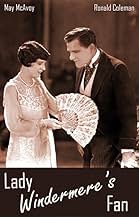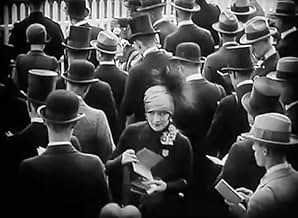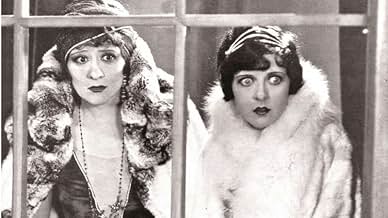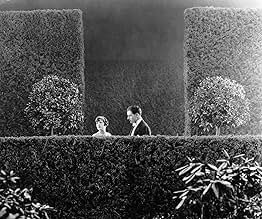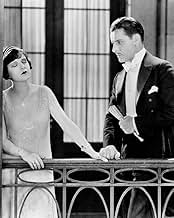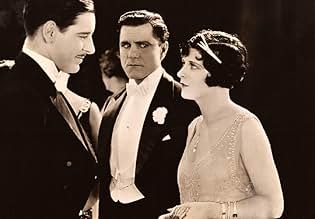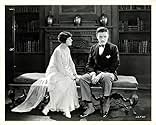CALIFICACIÓN DE IMDb
7.2/10
1.5 k
TU CALIFICACIÓN
Agrega una trama en tu idiomaA society woman believes her husband is having an affair, a misconception which may have dire personal consequences for all involved.A society woman believes her husband is having an affair, a misconception which may have dire personal consequences for all involved.A society woman believes her husband is having an affair, a misconception which may have dire personal consequences for all involved.
- Dirección
- Guionistas
- Elenco
- Premios
- 1 premio ganado en total
Edward Martindel
- Lord Augustus Lorton
- (as Edw. Martindel)
Carrie Daumery
- The Duchess of Berwick
- (as Mme. Daumery)
Billie Bennett
- Lady Plymdale
- (sin créditos)
Michael Dark
- Party Guest
- (sin créditos)
Helen Dunbar
- Mrs. Cowper-Cowper
- (sin créditos)
Frank Finch Smiles
- Waiter with Party Guest List
- (sin créditos)
Larry Steers
- Party Guest
- (sin créditos)
Ellinor Vanderveer
- Party Guest
- (sin créditos)
Percy Williams
- Waiter at the Party
- (sin créditos)
Opiniones destacadas
In "Lady Windermere's Fan" the great Ernst Lubitsch may have bitten off a bit more than he can chew. First and foremost, how can you reproduce Oscar Wilde's witty dialogue in a SILENT FILM?? True, the famous 'Lubitsch touch' is apparent, but minus Wilde it becomes a romantic drama.
The players are excellent and above reproach, in particular Irene Rich as Mrs. Erlynne - in fact, it is basically her picture. A youthful Ronald Colman as Lord Darlington underplays his role but is urbane and charming (in truth, I have not read or seen the play before but that is my perception). I have always liked Colman in everything I have seen him in, but, of course, you can't hear his marvelous voice and diction here.
Despite these drawbacks I enjoyed the film and felt the photography was exceptionally good. I just felt it would have been even better with a soundtrack, as it lacks the requisite bite and panache.
Sadly, a drawing room comedy of manners such as "Lady Windermere's Fan" wouldn't work today, as modern day audiences would be baffled by the subtlety and lack of action. That may be why it hasn't been remade successfully in the sound era. I give it a rating of 7.
The players are excellent and above reproach, in particular Irene Rich as Mrs. Erlynne - in fact, it is basically her picture. A youthful Ronald Colman as Lord Darlington underplays his role but is urbane and charming (in truth, I have not read or seen the play before but that is my perception). I have always liked Colman in everything I have seen him in, but, of course, you can't hear his marvelous voice and diction here.
Despite these drawbacks I enjoyed the film and felt the photography was exceptionally good. I just felt it would have been even better with a soundtrack, as it lacks the requisite bite and panache.
Sadly, a drawing room comedy of manners such as "Lady Windermere's Fan" wouldn't work today, as modern day audiences would be baffled by the subtlety and lack of action. That may be why it hasn't been remade successfully in the sound era. I give it a rating of 7.
Perhaps only Ernst Lubitsch could have created this masterpiece, a play by one of the world's greatest users of words turned into a silent motion picture.
I remember seeing this at the late and very lamented Silent Movie Theatre on Fairfax in Los Angeles, in the 1970s. And I remember marveling then how Lubitsch was able to create such a magnificent work.
Yes, he had the help of superlative actors -- May McAvoy's performance was truly a revelation -- and of course had the basic Wilde play as well as Julien Josephson's adaption, but it's his camera placement and where the actors performed that make this such a wonder.
I cannot recommend too strongly this "Lady Windermere's Fan," but when you go to YouTube, be careful to check out the various editions before you settle down to watch. One is terrible, but the one I saw is great. Worthy of a great movie.
I remember seeing this at the late and very lamented Silent Movie Theatre on Fairfax in Los Angeles, in the 1970s. And I remember marveling then how Lubitsch was able to create such a magnificent work.
Yes, he had the help of superlative actors -- May McAvoy's performance was truly a revelation -- and of course had the basic Wilde play as well as Julien Josephson's adaption, but it's his camera placement and where the actors performed that make this such a wonder.
I cannot recommend too strongly this "Lady Windermere's Fan," but when you go to YouTube, be careful to check out the various editions before you settle down to watch. One is terrible, but the one I saw is great. Worthy of a great movie.
An epigram-less silent screen version of Oscar Wilde by Ernst Lubitsch is likely to be a contest rather than a collaboration (and not surprisingly Lubitsch wins).
Irene Rich's handsome profile in the role of Mrs Erlynne provides a sight to savour throughout, and the race meet at which we see her from constantly switching viewpoints as people study her through their binoculars is one of the visual & cinematic highlights of the film.
Irene Rich's handsome profile in the role of Mrs Erlynne provides a sight to savour throughout, and the race meet at which we see her from constantly switching viewpoints as people study her through their binoculars is one of the visual & cinematic highlights of the film.
When a stage play is turned into a movie the results can be dire, especially when the play is a dialog-driven comedy of manners, full of quips and epigrams. Unless it's handled carefully even a great play might come off as 'canned' and lifeless on screen, amounting to little more than what Alfred Hitchcock dismissed as "photographs of people talking." A few exceptions come to mind: The Philadelphia Story, the two versions of Holiday made in the '30s, the Rex Harrison/Margaret Rutherford Blithe Spirit, and a handful of other stage-to-screen adaptations that manage to be lively and entertaining despite heavy reliance on dialog. But these films are surpassed in achievement, in one sense at least, by an adaptation from 1925 which perfectly captures the spirit of the play it presents while scarcely quoting it!
Before seeing Ernst Lubitsch's silent version of Lady Windermere's Fan at the Museum of Modern Art this summer I re-read Oscar Wilde's play, which I enjoyed, but I didn't have high hopes for the movie, despite the involvement of a director I count among my favorites. I imagined the movie would consist of actors standing around in tuxes and evening gowns pretending to mouth witty sayings, which would then be presented to us in numerous title cards; but because I admire Lubitsch's sound films a great deal I thought I'd give it a try. Plus, I thought it'd be interesting to see Ronald Colman in a silent film, deprived of that wonderful voice. What a pleasant surprise to find that this is one of the best sophisticated comedies of the silent screen. The flavor of Wilde's play is distilled to its essence, and clearly conveyed without relying on a single one of his famous epigrams. (Interestingly, a recent biography of Lubitsch says that the film quotes only two or three lines from the play, but if so I didn't catch them.) How is this possible?
Lubitsch conveys Wilde's notions about high society swells and their prejudices cinematically, not verbally. When the notorious Mrs. Erlynne (Irene Rich) appears at the Ascot race track, the reaction of "society" is quickly made clear to us by the scandalized facial expressions of the ladies present; who, nonetheless, can't stop looking at her or talking about her. The tone of their remarks is obvious from their sour expressions. Naturally, the men are interested in Mrs. Erlynne, too. She is shown, montage fashion, from many different angles, through lorgnettes and binoculars, long-shot, extreme long-shot and close-up, and while the horse race is reduced to mere background. It's a funny and informative sequence, yet it isn't in Wilde's play at all. In another scene that more closely follows the text, Lord Darlington (Colman) calls on Lord and Lady Windermere at their home. He is formally announced, and pretends briefly that he actually came to see Lord Windermere on some minor matter. But when Windermere conveniently leaves on business, Darlington, shown in a stately long-shot, strides away from Lady Windermere (May McAvoy), sits, shoots her a sly look, and announces that he is in love with her. Shocked, she crosses and drops into a chair next to him. He rises, crosses away from her, and drops into a different chair. They both look miserable. Fade-out. It's a beautifully staged scene, and no additional dialog is necessary.
Another sequence that occurs late in the film perfectly epitomizes the famous Lubitsch Touch while deftly conveying the spirit of Wilde's play: a title card announces that "The relations between a man and a woman can be told by the way he presses her doorbell." Various ways in which this is so are then demonstrated. You wouldn't think that a close-up shot of a doorbell and a gentleman's gloved hand could be so suggestive, but Lubitsch manages to suggest a great deal.
The black & white cinematography of Lady Windermere's Fan positively shimmers; happily, this is one silent film that has been well preserved. The acting is quite restrained by the standards of the day, and even without his voice Ronald Colman has the presence of a star, while Irene Rich gives the performance of her career. It's a wonderful adaptation of a great play that can stand on its own as cinema; and it may come as a surprise to those who believe silent film comedy begins and ends with Ben Turpin and the Keystone Cops.
Before seeing Ernst Lubitsch's silent version of Lady Windermere's Fan at the Museum of Modern Art this summer I re-read Oscar Wilde's play, which I enjoyed, but I didn't have high hopes for the movie, despite the involvement of a director I count among my favorites. I imagined the movie would consist of actors standing around in tuxes and evening gowns pretending to mouth witty sayings, which would then be presented to us in numerous title cards; but because I admire Lubitsch's sound films a great deal I thought I'd give it a try. Plus, I thought it'd be interesting to see Ronald Colman in a silent film, deprived of that wonderful voice. What a pleasant surprise to find that this is one of the best sophisticated comedies of the silent screen. The flavor of Wilde's play is distilled to its essence, and clearly conveyed without relying on a single one of his famous epigrams. (Interestingly, a recent biography of Lubitsch says that the film quotes only two or three lines from the play, but if so I didn't catch them.) How is this possible?
Lubitsch conveys Wilde's notions about high society swells and their prejudices cinematically, not verbally. When the notorious Mrs. Erlynne (Irene Rich) appears at the Ascot race track, the reaction of "society" is quickly made clear to us by the scandalized facial expressions of the ladies present; who, nonetheless, can't stop looking at her or talking about her. The tone of their remarks is obvious from their sour expressions. Naturally, the men are interested in Mrs. Erlynne, too. She is shown, montage fashion, from many different angles, through lorgnettes and binoculars, long-shot, extreme long-shot and close-up, and while the horse race is reduced to mere background. It's a funny and informative sequence, yet it isn't in Wilde's play at all. In another scene that more closely follows the text, Lord Darlington (Colman) calls on Lord and Lady Windermere at their home. He is formally announced, and pretends briefly that he actually came to see Lord Windermere on some minor matter. But when Windermere conveniently leaves on business, Darlington, shown in a stately long-shot, strides away from Lady Windermere (May McAvoy), sits, shoots her a sly look, and announces that he is in love with her. Shocked, she crosses and drops into a chair next to him. He rises, crosses away from her, and drops into a different chair. They both look miserable. Fade-out. It's a beautifully staged scene, and no additional dialog is necessary.
Another sequence that occurs late in the film perfectly epitomizes the famous Lubitsch Touch while deftly conveying the spirit of Wilde's play: a title card announces that "The relations between a man and a woman can be told by the way he presses her doorbell." Various ways in which this is so are then demonstrated. You wouldn't think that a close-up shot of a doorbell and a gentleman's gloved hand could be so suggestive, but Lubitsch manages to suggest a great deal.
The black & white cinematography of Lady Windermere's Fan positively shimmers; happily, this is one silent film that has been well preserved. The acting is quite restrained by the standards of the day, and even without his voice Ronald Colman has the presence of a star, while Irene Rich gives the performance of her career. It's a wonderful adaptation of a great play that can stand on its own as cinema; and it may come as a surprise to those who believe silent film comedy begins and ends with Ben Turpin and the Keystone Cops.
At first it might not seem as if the combination of Ernst Lubitsch and Oscar Wilde would work very well, but this silent-screen adaptation of Wilde's "Lady Windermere's Fan" is both enjoyable and well-crafted. Instead of clashing, Lubitsch's stylish, mischievous approach and Wilde's perceptive cynicism complement each other. The characters and the story are Wilde's, the acting and the style are Lubitsch's.
Although the material is heavily re-worked from the original play, Lubitsch's decisions all seem to work pretty well. Wilde's witty and resourceful dialogue is gone, but his insightful portrayals of human nature remain. Lubitsch also makes good use of the camera to bring off some shots that could not have worked on the stage. In particular, at times he makes the fateful fan seem almost a full-fledged part of the cast.
This movie version features solid performances by May McAvoy and Bert Lytell as the Windermeres, with a youngish-looking Ronald Colman suitably ingratiating as Lord Darlington. But Irene Rich has the most interesting character, and as Mrs. Erlynne she also gives a fine performance that particularly stands out in her scenes with the other characters. She and Lubitsch both capture the nature of her unpopular but admirable character, while carefully setting up the contrasts and conflicts between her and the other characters, who are in general more socially acceptable but far less worthy.
This also works well simply as an entertaining, often very amusing, and sometimes dramatically compelling story. For most silent film fans, it would definitely be worth tracking down and watching.
Although the material is heavily re-worked from the original play, Lubitsch's decisions all seem to work pretty well. Wilde's witty and resourceful dialogue is gone, but his insightful portrayals of human nature remain. Lubitsch also makes good use of the camera to bring off some shots that could not have worked on the stage. In particular, at times he makes the fateful fan seem almost a full-fledged part of the cast.
This movie version features solid performances by May McAvoy and Bert Lytell as the Windermeres, with a youngish-looking Ronald Colman suitably ingratiating as Lord Darlington. But Irene Rich has the most interesting character, and as Mrs. Erlynne she also gives a fine performance that particularly stands out in her scenes with the other characters. She and Lubitsch both capture the nature of her unpopular but admirable character, while carefully setting up the contrasts and conflicts between her and the other characters, who are in general more socially acceptable but far less worthy.
This also works well simply as an entertaining, often very amusing, and sometimes dramatically compelling story. For most silent film fans, it would definitely be worth tracking down and watching.
¿Sabías que…?
- TriviaOne of the 50 films in the three-disk boxed DVD set called "More Treasures from American Film Archives, 1894-1931" (2004), compiled by the National Film Preservation Foundation from five American film archives. This film is preserved by the Museum of Modern Art, has a running time of 89 minutes and an added piano music score.
- Citas
Opening title card: Lady Windermere faced the grave problem of seating her dinner guests.
- ConexionesFeatured in Historia del cine: Epoca muda (1983)
Selecciones populares
Inicia sesión para calificar y agrega a la lista de videos para obtener recomendaciones personalizadas
- How long is Lady Windermere's Fan?Con tecnología de Alexa
Detalles
- Fecha de lanzamiento
- País de origen
- Idioma
- También se conoce como
- Tajna ledi Vindermir
- Locaciones de filmación
- Toronto, Ontario, Canadá(Racetrack Scene)
- Productora
- Ver más créditos de la compañía en IMDbPro
Taquilla
- Presupuesto
- USD 320,000 (estimado)
- Tiempo de ejecución2 horas
- Mezcla de sonido
- Relación de aspecto
- 1.33 : 1
Contribuir a esta página
Sugiere una edición o agrega el contenido que falta

Principales brechas de datos
By what name was Lady Windermere's Fan (1925) officially released in Canada in English?
Responda
